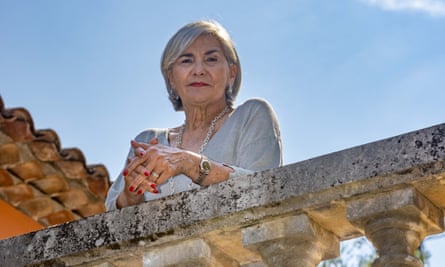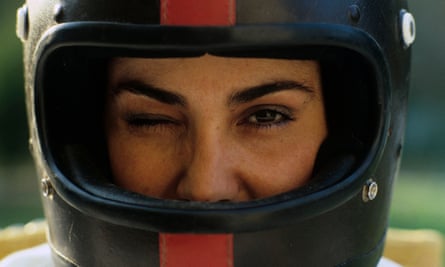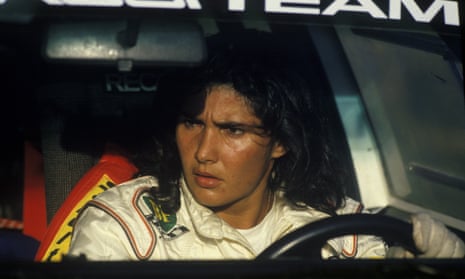Trailblazer, record holder and multiple winner, Michèle Mouton drove her way to success as a woman in an overwhelmingly masculine environment. Much as her name may not be familiar nowadays, she remains an inspiration and force for change in motorsport a full 40 years after her heyday in the World Rally Championship (WRC). Today, appropriately, the men she bested recognise her achievements.
The 70-year-old prefers to look forward rather than dwell on the past. Her work as the president of the FIA women in motorsport commission is her passion but Mouton is happy to revisit another era, indeed almost another lifetime as her racing career is celebrated in the film Queen of Speed, released on Sky on Saturday.
It is a marvellous documentary, focusing on the fearsome, high-speed and often terrifying Group B era of rallying in the early 80s when Mouton went up against the best drivers in the world and beat them at their own game. The film is a reminder of what a different age it was, exemplified in the spectacularly sexist car ads it gleefully re-runs.
They reflect the attitude within a male-dominated sport. The suggestion she was chosen only because of who she was sleeping with, that her cars or engines were altered for an advantage and when that was disproved, that they were simply so superior anyone could win in them. Yet for Mouton the brickbats meant nothing. Men’s opinions would not define her, she raced because she loved it.
“I didn’t mind, I knew what I was doing and who I was sleeping with,” she says with a bright laugh. “I never needed, or wanted or thought I had to justify myself in anything. I did all that for myself. Not to be the only woman in their world. What has always been important was to prove to myself that I was able to do it and to reach their level but it was for me, not for them. I just wanted to do the same, that’s all.”
The Frenchwoman succeeded brilliantly and in doing so silenced the critics. “Mouton is never shown any quarter by her male rivals, nor does she ask any, for she is a rally driver among rally drivers,” wrote Motorsport Magazine in 1981.

Mouton remains the only woman to have won rounds of the WRC. She came within a whisker of taking the title in 1982, alongside her co-driver Fabrizia Pons, when she raced on through family tragedy only for bad luck to deny her shot at winning.
She grew up in Grasse, where her parents grew jasmine and roses for the local perfume industry, and was not faintly interested in motorsport until a friend asked her to co-drive in the 1973 Monte Carlo rally, sparking something. Her father offered to back her for a year to drive competitively to see if anything would come from it and she excelled. It turned out Mouton loved motor racing.
When Audi had offered her the chance to drive their new Quattro in 1981 – the all-wheel drive car that would change rallying – she jumped at the chance. The German manufacturer doubtless had one eye on the PR value of a female driver but Mouton was only interested in proving what she could do behind the wheel.
The ultimate winner of that year’s championship Ari Vatanen observed: “The day I will be beaten by a woman I will stop racing.” At the San Remo rally that year Mouton duly did so. Vatanen did not retire.
The victory was a huge sensation and made Mouton a very public figure. In the early 1980s rallying rivalled Formula One in popularity. Huge crowds flocked to the events, lining the roads. The footage in the film is a vivid reminder of those times. Of the speeds and the danger and not just for those in the cars. Fans stood inches from them, they waited mid-track to take pictures before throwing themselves out of the way. They tried to touch the bodywork as the cars hurtled past and Audi mechanics would have to remove parts of fingers from Mouton’s car.
In 1982 she proved beyond doubt that she had earned that respect. She won three rallies in Portugal, Greece and Brazil. By the penultimate event, the Ivory Coast rally, she was in second place in the championship, seven points behind the Opel driver and 1980 champion, Walter Röhrl.
Röhrl was another who had dismissed Mouton, caustically stating that at the time you could put a monkey in the Audi and it would win. Mouton was, of course, also beating her Audi teammate at the time, Hannu Mikkola, no monkey and no slouch as WRC champion in 1983 and who was driving identical machinery.
A win would reduce Röhrl’s lead to two points and the WRC scoring system meant that Mouton could take the title with third at the final round even if Röhrl won. Just before the event, however, her father died. She wanted to pull out but her mother said she should race on as that was what he wanted.

Reluctantly she did so and pulled out a huge lead of over one hour on Röhrl, only to lose it all through a sequence of mechanical problems: a new gearbox and fuel injector had to be fitted, there was a broken radiator and driveshaft and at one point her car refused to start.
Desperate to make the time back, she pushed too hard and crashed twice. The second time beyond repair. Her title bid was over yet it was as nothing to the loss of her father. “I didn’t mind about the championship, it was no comparison,” she says. “I tried, we tried everything and it didn’t work, that’s all. That’s life. You cannot win all the time. I lost so much compared to the competition.”
It was the high point of her rallying career. She did race on for a further four years and again made her mark in becoming the first and still only woman to win and set a new record time in the formidable Pikes Peak hill climb event in the US. Even there the organisers tried to slow her down by impeding her start for alleged rule infringements. It only motivated her more.
In 1986 Mouton retired to start a family. She kept her hand in with occasional forays into driving but found a real calling in becoming the first president of the women in motorsport commission in 2010. Enthusiastically embracing the challenge, she focuses on bringing girls into the sport at a grassroots level.
Röhrl now describes Mouton as “a pioneer who will never be forgotten” and Vatanen offers similar praise in the film to the woman he says “had awoken the rally world”.
Vindication then, and her place in history is assured, but it means little to the woman whose piercing eyes bear the same striking sense of purpose today as they do peering out of her helmet on celluloid from the eighties. The film itself ends on what feels an almost melancholy note as Mouton reveals all her trophies are boxed up and gathering dust in a shed in her garden but she smiles when it is mentioned. Silverware was never the point, being the best she could be, gender be damned, was all that mattered.
“I was not thinking about glory or to be famous,” she says. “I did something good, I did something well. What was important for me was to do it and to do it well. For me it’s not something you have to show. I did it for me.”
